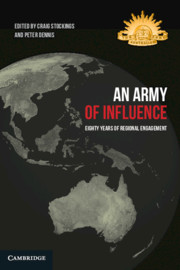Book contents
- An Army of Influence
- Acknowledgement of Country
- An Army of Influence
- Copyright page
- Foreword
- Contents
- Figures, maps and tables
- Contributors
- Abbreviations
- Introduction
- Part 1 The concept of an army’s influence abroad
- Part 2 Lessons from past relationships
- Part 3 Ongoing relationships
- Chapter 9 Access, but how much influence?
- Chapter 10 Australia’s military engagement with Malaysia, 1955–2020
- Chapter 11 Cambodia
- Chapter 12 Was the juice worth the squeeze?
- Chapter 13 Achieving influence through advising relationships
- Chapter 14 Training teams as a force of choice
- Chapter 15 A perspective on diplomacy in the Army’s contemporary regional relationship-building
- Chapter 16 The Army’s patchy engagement with Australia’s near north
- Index
Chapter 13 - Achieving influence through advising relationships
from Part 3 - Ongoing relationships
Published online by Cambridge University Press: 16 November 2021
- An Army of Influence
- Acknowledgement of Country
- An Army of Influence
- Copyright page
- Foreword
- Contents
- Figures, maps and tables
- Contributors
- Abbreviations
- Introduction
- Part 1 The concept of an army’s influence abroad
- Part 2 Lessons from past relationships
- Part 3 Ongoing relationships
- Chapter 9 Access, but how much influence?
- Chapter 10 Australia’s military engagement with Malaysia, 1955–2020
- Chapter 11 Cambodia
- Chapter 12 Was the juice worth the squeeze?
- Chapter 13 Achieving influence through advising relationships
- Chapter 14 Training teams as a force of choice
- Chapter 15 A perspective on diplomacy in the Army’s contemporary regional relationship-building
- Chapter 16 The Army’s patchy engagement with Australia’s near north
- Index
Summary
Between mid-2015 and 2020, as research for a doctoral thesis, I interviewed over 50 military personnel who were directly involved in a role advising a partner security force. This included Australian Defence Force (ADF) personnel who participated in mentoring task forces, train-advise-assist (TAA) roles, Defence Cooperation Program (DCP) initiatives and several other one-on-one or team advisory duties. The research also included interviews with allied personnel from the United States Army, particularly where they had been involved in joint initiatives with the ADF. Interviews also included host-nation personnel from the Afghan National Security Forces and Papua New Guinea Defence Force (PNGDF), to provide the views of personnel being advised or mentored, to determine what mattered to them and to obtain an alternative perspective. Interview subjects ranged in rank from sergeant to four-star US general, to garner both tactical and command perspectives.
Keywords
- Type
- Chapter
- Information
- An Army of InfluenceEighty Years of Regional Engagement, pp. 300 - 320Publisher: Cambridge University PressPrint publication year: 2021

